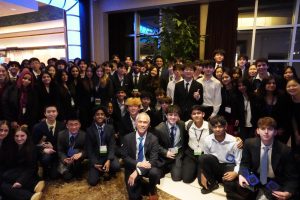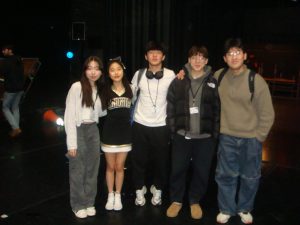BCA Debate: During and After the Pandemic
March 29, 2023
The BCA Debate team is a part of the Bergen County Debate League, where students from all over the county compete in debates against one another. Students are grouped into partners and debate other duos from other teams. Each team is assigned a particular side, affirmative or negative, to debate the topic, referred to as the resolve.
On October 18th of 2022, Mr. Russo, the coach of the BCA Debate Team and the president of the Debate League, announced the return of the live debate competitions for the Bergen County Debate League following the pandemic.
With the onset of the COVID-19 pandemic, many extracurricular activities had to limit their activities to virtual meetings. For debate, this would greatly hinder key elements that are present in these events. Physically, it would introduce Zoom and change various rules to accommodate the capabilities of computers.
It took Debaters a long time mentally to get used to the changes that accompanied Zoom as opposed to Live Debate. While the BCA Debate Team was certainly impacted by the Pandemic, especially having to forfeit the benefits of physical meetings, there were benefits. Debaters were allowed to take advantage of the opportunities that digital technology provided the debating community.
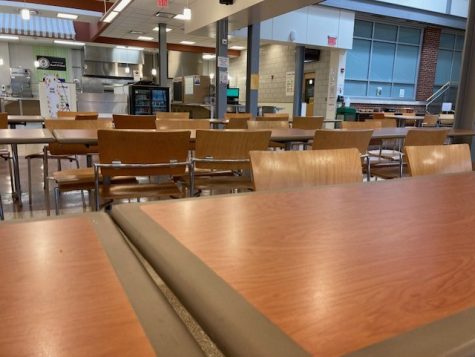
Students from around Bergen County gather in the 2nd Floor Cafeteria before heading off to debate in rooms inside the school.
COVID-19 hit BCA a couple months after its discovery in 2019. Just before the last debate of the Varsity competitions, the Debate League canceled all physical activities. Mr. Russo stated that the transition to a virtual environment was done at the same time as the schools around the county closed. “After that, schools acquired Zoom accounts, so for the 2020-21 season, we held all tournaments that way.”
From that point onwards, Zoom was the major program used for all of the club’s activities, from meetings to the actual competitions. The straightforward nature of Zoom was very beneficial in terms of efficiency, as Mr. Russo made clear. “Zoom really was a God-send…We could set up as many breakout rooms as needed and did everything as normally as possible.”
Breakout rooms would prove to be beneficial due to their lack of limitations, as physical debates required students to use the classrooms around the school for debating, which were in limited number. Mr. Russo stated that Zoom was able to set up as many breakout rooms as needed for the debates, but otherwise did not impact the debate experience too much, with the only difference being “… it just wasn’t in-person…”, Mr. Russo reaffirmed.
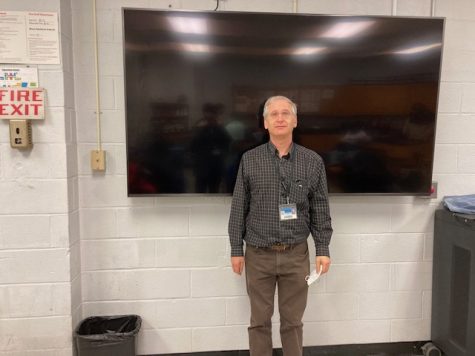 Mr. Russo, Coach of the BCA Debate Team and President of the Bergen County Debate League
Mr. Russo, Coach of the BCA Debate Team and President of the Bergen County Debate League
The Co-Captain of the Varsity and Junior Varsity Teams, Emily Yoo remarked that using Zoom “ was a very different experience.” because the students no longer had to worry about finding the right room or building and only had to click a zoom link to join.
Although Zoom did provide some ease, it also brought along some hardships. Mr. Russo stated that internet access was allowed for debaters due to the lack of control staff had on what students did with their computers.
The Co-Captain stated how this would make debates “a lot harder for the Affirmative since it allowed the negative to find information about your plan” while making it easier for the Negative Team to organize their points, due to the free access to the Internet during Debates. While the preparation of the debates was far more simple and far easier to organize, this shows the actual debates themselves would vary in difficulty in comparison to their live counterparts.
However, due to the easily accessible nature of such information, there was another upside to this Internet access. Mr. Russo stated it could be used as quick fact check, “…debaters could check their opponents’ evidence in real time which cut down on the chances of people making up fake evidence.”
Pandemic restrictions had been lifted at the end of the 2021-2022 season, so all current debate competitions have been occurring in-person. There were various issues that occurred throughout this debate season, as Mr. Russo stated, “A lot of the debaters forgot which table to sit at and some didn’t know where to stand when giving their speeches.”
Debaters like the Co-Captain already had been involved in in-person debates, stating that her experience in the Novice Debate League allowed her to know how to conduct herself during a debate. However, in regards to =inexperienced debaters, they weren’t so fortunate, so the co-captain had to teach these debaters proper live debate etiquette. “They knew kind of what to say and how to actually debate but they didn’t know where to stand in terms of whether they should face the judge or your opponent.”
Other than that, the Co-Captain would remark that the adjustment back to not using the internet during the negative team’s section was quite difficult, as she stated that she had to remember that she had no access to the internet during her debates.
There were also certain logistical challenges that arose due to being back in-person, with Varsity debates now taking up the entire day, as stated by the Co-Captain, “I would say that I miss a lot of school now that they (the debates) are in person,”.
While the physical experience had been rough for those unfamiliar with the environment, there was a significant merit to it according to debaters. A junior varsity debater in the Bergen County Debate league would describe this as, “it feels a lot more real in person.”
The Co-Captain further elaborated on this “real” sensation, “the dynamics of having a conversation really come into play in person because how you posture yourself, how well you make eye contact with the judge instead of just staring at the screen.” There is a definite consensus among the debaters that the in-person experience added a level of depth to debates that is harder to reach in a virtual debate.
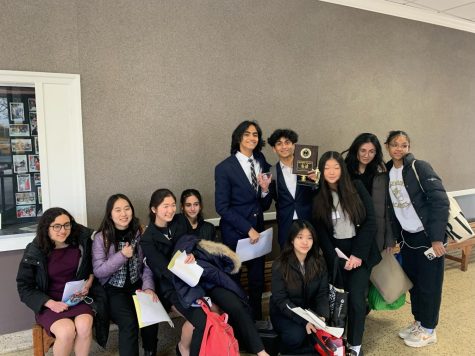
BCA Varsity Debaters Celebrating 2nd Place Placing in the League Tournament
The Junior Varsity Debater’s love of debate also comes from the quick thinking that is required of debaters, “You have to be quick always, …you always have to be able to provide facts and responses and arguments”. This combination of quick thinking and public speaking skills were not necessarily limited to virtual or physical debates, showing a universal liking of debate in general.
In fact, certain aspects of the enjoyability of BCA debate were present for both the virtual and live environments, as this Junior Varsity debater had joined the Debate team of Bergen County Academies to “improve my ability to do public speaking and I am also very interested in politics and History”.
The Co-Captain of the debate team had also repeated these aspirations as common and important characteristics of debaters, stating that debaters should “really enjoy learning about how the government works and different policies and basically what the government can and cannot do.”
The Co-Captain also mentioned other important characteristics, such as the will to research the debate topic, “‘Cause a debate is not just the 40 minute round, its the hours of research writing your speech, getting familiar with the resolved,”. Teamwork also factored into the debating experience, as it is a necessary part of debating in the debate league “Being able to work with a partner is a very big deal. If.. you want to make sure that this partnership is sustained for multiple years, it’s really important that you get along with your partner to have someone to work with.” These core mechanics of debate were unchanged, and was also the reason why debaters understood the basics of debate through the transition period, as these core mechanics were what made debate enjoyable in the end.
The Junior Varsity Debater noted the quick thinking and organization needed in the debate environment. “The best students are the people who are organized and have all their documents ready to go. People who are fast, people who are able to provide responses as quick as possible,”
Likewise, Mr. Russo added onto characteristics of a successful debater as having good public speaking skills, “Students should be very personable and enjoy presenting in front of an audience. They also have to be able to think on their feet especially during cross-examimations,”
However, these skills did not need to be existent in their complete form before joining Debate, and they were already fostered as a result of the debate experience, as stated by the Co-Captain, “You don’t have to be the most outgoing person to debate…These are all daily skills that we learn in class …every BCA student will have the experience to think clearly…these are not skills we learn specifically during the debate session.”
Despite BCA debate going through various trials during and after COVID-19, the core mechanics of what made a BCA debate still persist and bring in people to join debate. The BCA Debate Team in both virtual and live environments fostered the improvement of public speaking and used it to discuss issues throughout the world. If you ever wish to join the Club, you may email Mr. Russo for further details on the next Debate season: [email protected].




